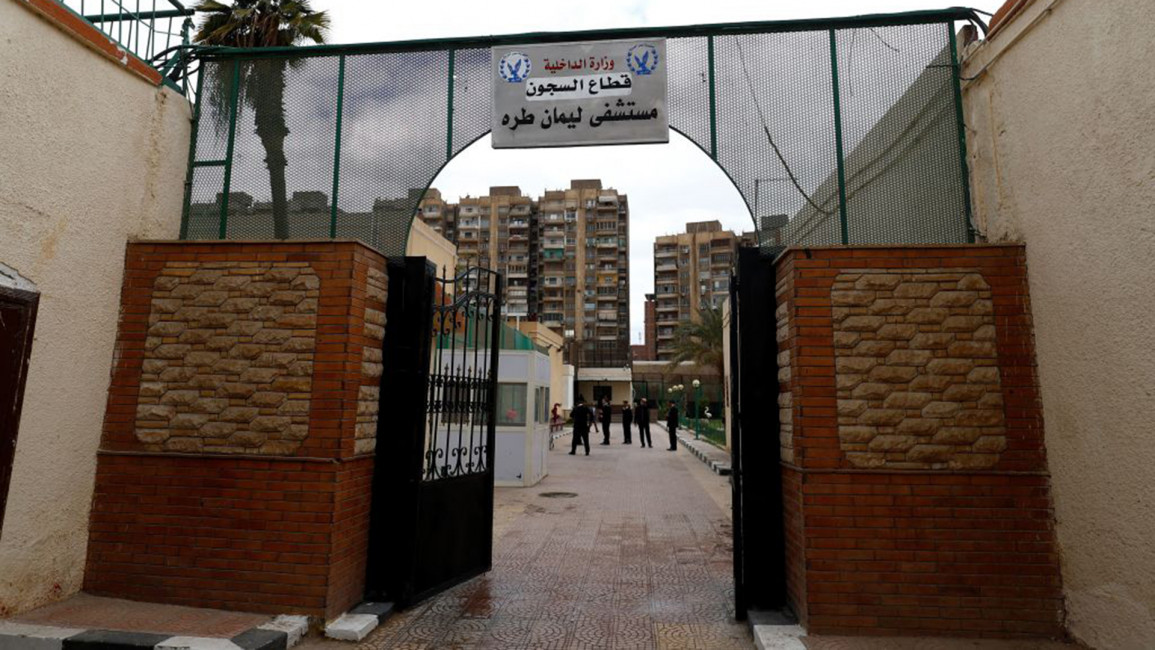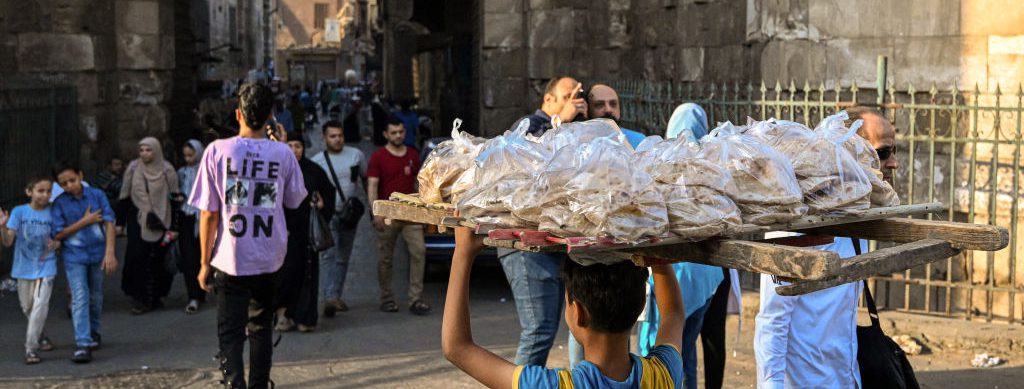A rights group said the detention centre had refused one detainee access to a specialist doctor after he complained about chest pains.
The New Arab Staff
18 July, 2024

Six political prisoners died in detention centres in the space of one week in Egypt [Getty]
The death of six detainees in Egyptian prisons in the space of one week has sparked concerns among rights groups, further highlighting terrible conditions in prisons across the country.
The Egyptian Network for Human Rights (ENHR) reported that the six political prisoners died in a detention centre in the Sharqia governorate while tens of thousands of other detainees enter their 12th year behind bars.
One of the prisoners was identified as Mohamed Farouk Hussein, 49, who was reportedly suffering from health issues and was finally transferred to Zagazig Hospital where he died on Monday.
Hussein had suffered chest pains and shortness of breath for several weeks with his requests for treatment repeatedly refused by prison authorities, the ENHR said.
The rights group also warned that prison conditions had deteriorated across the country, with high temperatures and overcrowding common, with some detention centres three times over capacity.
Five other detainees died in the same prison within 48 hours, ENHR said, pinning the cause of their death to suffocation due to poor ventilation, dehydration, high temperatures, and overcrowding, while prison authorities only distribute water for two hours a day despite the suffocating heat.
Poor sanitary conditions within the prison had also caused the spread of diseases.
"These deaths are a microcosm of the serious violations that occur in police detention centres in Egypt, amid a complete lack of oversight and inspection by the responsible authorities," Ahmed El Attar, the executive director of ENHR said in a statement cited by various news publications.
Sexual harassment
ENHR recently reported several cases of sexual harassment and poor treatment of women detainees by senior police officers at the Zagazig detention centre.
In a testimony to the rights group, one female prisoner said women there are often touched inappropriately when male officers search them with no female staff working in the women's section of the detention centre.
ENHR said it "holds the ministry of interior responsible for the deaths of detainees", calling for immediate action and an investigation into the deaths.
It comes as Amnesty International warned that 119 people had been detained in a crackdown over calls for protests over rising energy prices and power cuts which never materialised.
Local and international human rights groups estimate that Egypt has detained as many as 60,000 people since current President Abdel-Fattah El-Sisi overthrew Mohamed Morsi, the country's first democratically elected leader, in a military coup in 2013.
In recent weeks, frustrations about price hikes and power cuts have fueled demonstrations and calls for revolution against the government of Egyptian President Abdel Fattah al-Sisi. The arrests have spanned six governorates since early July, come amid rising public discontent over soaring prices and ongoing power cuts in the country.
In reporting on the arrest figures, Amnesty International cited human rights lawyers from the Egyptian Initiative for Personal Freedoms (EIPR) and the Egyptian Commission for Rights and Freedoms (ECRF). Seven of these arbitrary arrests occurred over content posted on Facebook and X claiming anti-government protests. Most of the charges investigated against the detainees by the Supreme State Security Prosecution (SSSP) include “joining a terrorist group, publishing false news and misuse of social media”.
Arbitrary arrests are prohibited under international law by Article 9 of the International Covenant on Civil and Political Rights (ICCPR). This article establishes the right to liberty and security, entailing that no individual shall be subjected to arbitrary arrests. Referring to the 119 cases presented, Mahmoud Shalaby, Amnesty International’s Egypt Researcher, stated:”The Egyptian authorities must immediately and unconditionally release all those arbitrarily detained solely for exercising their right to freedom of expression”.
Egypt has been experiencing a rise in prices and continuous electricity cuts as part of a series of cost-saving measures. This has created general discontent against the government which has increased pressure against protesters, opposition activists, and human rights advocates. As of June 15, human rights organizations have called for Egypt to stop targeting human rights lawyers and stop disregarding international human rights norms.
Amnesty International calls for a different approach by the government to the situation. As Shalaby said, “Instead of silencing people for expressing their discontent and continuing to use brutal tactics to eradicate any public protests, the government of Egypt must take concrete steps to fulfill people’s social and economic rights”.
Egypt: More than 100 arbitrarily detained over calls for anti-government protests
©KHALED DESOUKI/AFP via Getty Images
July 18, 2024
The Egyptian authorities have embarked on a new wave of arbitrary arrests of dozens of people against the backdrop of calls for anti-government protests amid rising public discontent at soaring prices and ongoing power cuts, Amnesty International said today.
Since the beginning of July, Egyptian security forces have arbitrarily detained 119 individuals, including at least seven women and one child, in at least six governorates, in connection to online calls for a “Dignity Revolution” on 12 July. Detainees posted on their social media accounts calling for protests and for the ousting of President Abdel Fattah al-Sisi’s government due to price hikes and the year-long power cuts. The protests eventually did not materialize.
“It is utterly shameful that complaining about worsening economic and living standards means imprisonment in Egypt. Instead of silencing people for expressing their discontent and continuing to use brutal tactics to eradicate any public protests, the government of Egypt must take concrete steps to fulfill people’s social and economic rights,” said Mahmoud Shalaby, Amnesty International’s Egypt Researcher.
“The Egyptian authorities must immediately and unconditionally release all those arbitrarily detained solely for exercising their right to freedom of expression. They must ensure that people can exercise their right to protest without having to fear retribution.”
Egypt has been witnessing a rise in discontent among people who are struggling to meet their basic needs amid hikes in food and fuel prices and a shortage of medicines across the country.
In January 2024, people in Egypt were hit by a series of price hikes that included telecom fares and metro tickets. Since July 2023, the Egyptian government has implemented cost-saving measures including cutting electricity for two hours every day in all areas of the country, except some governorates with high numbers of tourists. The cuts affect several aspects of life in the country, including access to water which requires pumps to reach higher floors in many buildings. Local media reported several deaths of people who got stuck in elevators during the cuts.
It is utterly shameful that complaining about worsening economic and living standards means imprisonment in Egypt.Mahmoud Shalaby, Amnesty International
Amnesty International conducted interviews with human rights lawyers representing eight detainees, including lawyers at the Egyptian Initiative for Personal Freedoms (EIPR) and the Egyptian Commission for Rights and Freedoms (ECRF). They said the total number of people brought before the Supreme State Security Prosecution (SSSP) in the criminal cases involving their clients in relation to the protests calls was 119 as of 16 July 2024.
Eight of the detainees, aged from their thirties to their sixties, do not have a history of political activism and come from divergent backgrounds and professions. Seven posted content on Facebook and X (formerly Twitter) under the hashtag “Dignity Revolution” calling for anti-government protests. One posted a video calling the parliament to impeach President Abdel Fattah al-Sisi.
Security forces detained the eight at their houses and workplaces in Cairo, Giza, Al Gharbia, Beni Souif, Red Sea, Alexandria and Menoufia governorates, before transferring them to police stations or National Security Agency (NSA) facilities. They kept seven of the eight incommunicado for periods ranging between two to five days. NSA agents questioned them while being blindfolded, which amounts to ill-treatment, and without the presence of a lawyer.
Authorities later transferred the detainees to the SSSP which opened investigations against them over charges of ‘joining a terrorist group’, ‘publishing false news’ and ‘misuse of social media.’ The prosecution ordered the pretrial detention of the eight along with 111others who faced similar charges, for 15 days pending investigations. The evidence against the eight individuals detained was screenshots from their social media accounts in addition to their personal mobiles.
SSSP prosecutors asked the detainees about their personal and professional life, the reasons they supported the protests calls, and whether they expected people to take to the streets on 12 July or not.
A detainee in his forties told the prosecutors that he has three children and has been suffering to provide for them despite working long hours in a physically demanding job, which made him support the calls to express his anger.
Another detainee in his thirties who works in a private company told prosecutors that he wrote “Enough Sisi, go away” because he was no longer able to afford life necessities as his salary is never sufficient amid the price hikes.
Background
Amnesty International previously documented how the Egyptian authorities carried out preventive mass arrests of hundreds of people amid protests calls in the lead-up to COP 27 in 2022.
Since 2013, the Egyptian authorities have been severely repressing the rights to freedom of expression, association and peaceful assembly and clamping down on critical voices offline and online. Thousands of actual or suspected government critics continue to be arbitrarily detained.

No comments:
Post a Comment